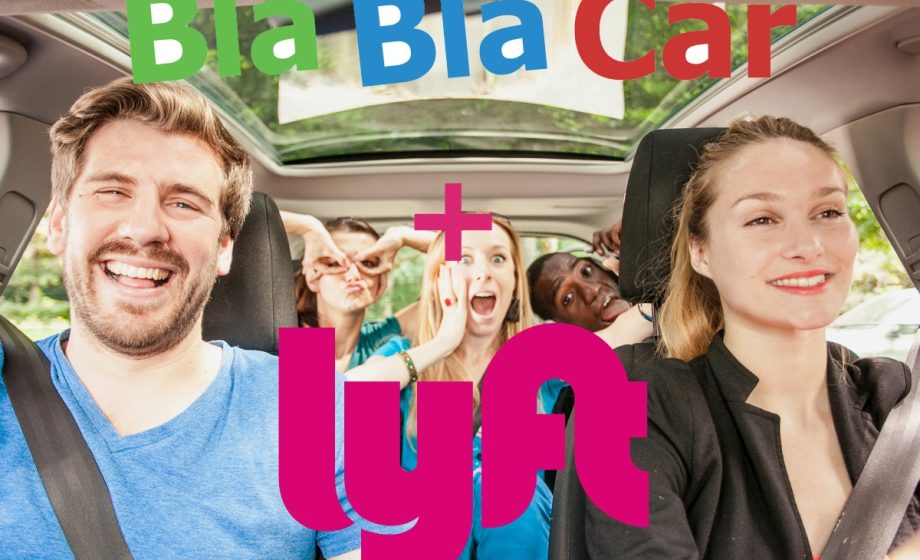
It started as far back as last year, when Blablacar raised $100 Million to ‘go global’ – everyone had always known that Mazzella’s ambitions were big, but $100 Million was a whole new ball game. One year later, the company raised $200 Million more and it’s safe to say that there’s no stopping the BlaBlaCar. Today, they are present in most of Europe, India & Mexico, and they’ve got plans to open a handful of new markets in the beginning of 2016.
It’s not something I throw out lightly, to say that I think that two Unicorns should merge together. It’s not a fantasy celebrity couple, or an attempt to pack as many buzz words into a single title (otherwise I would’ve crammed Unicorn, Rudeicorn, Decacorn, and a couple other terms in there), but the result of:
- Living in the heart of the Sharing Economy (Paris).
- Following Blablacar for more than 4 years as they evolved from covoiturage.fr into the giant that they are today.
Lyft + Blablacar = Perfect Combo
There are a few initial observations that make merging the two companies together optimal. That is, if they both decided it was good to consider, it’s obvious that some of the most important variables would line up perfectly.
First, from a brand perspective, while they both have very strong brands, their relationship with their users (drivers & passengers) is very much the same. Lyft combats the impersonal feel of Uber by creating a sense of community, while Blablacar has done wonders to remove all aspects of anonymity & distrust from what is essentially hitchhiking online (I say that as a known “rude hitchhiker” – my handle on this blog and the source of the “rude” in Rude Baguette).
In addition, because Lyft shuttered its long-distance ridesharing business early on (Side Car, anyone?), and because Blablacar has always avoided intra-city travel, it is as if Greyhound was merging with your local bus line. Blablacar has already considered getting into short-distance travel in the past – through a failed acquisition of Djump that never got completed – and Lyft dropped its long-distance ridesharing service when Uber stepped up the short-distance pressure.
Blablacar needs users to turn the Blablacar app on more often if they want to be able to provide real-time ride offers, and Lyft needs drivers to make longer trips if they want to diversify their competition with Uber.
Not that it needs to be said, but Uber & Blablacar would obviously be a terrible fit – the relationship with users (drivers & passengers) just doesn’t line up, and I couldn’t see Travis Kalanick & Fred Mazzella being on the same page, despite the fact that Uber has enough money to buy Blablacar 10 times over.
Lyft desperately needs growth abroad – the company already called off plans for European expansion this year after Uber stepped up competition in NYC, and, as I’ve said before, you can’t be a global leader in the Sharing Economy if you’re not a leader in Paris (Airbnb’s #2 city for revenue, Uber’s #2 city for revenue, Blablacar’s #1 country for revenue).
Why this might not work, but really should.
Now, the biggest factor that’s going to play here – or maybe it already has – is going to be a question of control. I tend to see Blablacar as the more dominant of the two, to which you may respond that Lyft has a higher valuation and more money raised. Well, given the sentiment in the valley of predicting dying Unicorns, I think it’s enough to say that sometimes a valuation isn’t a valuation, whereas Blablacar (valued at $1.6 Billion) has arguably raised the minimum required fundraising, despite planning to grow from 400+ at the end of 2015 to 700+ this time next year: in fact, in the past year, Blablacar has recruited one new employee per day. In France.
There are certainly financial details that I won’t even begin to scratch the surface. Blablacar has virtually no competitors, whereas Lyft is on the receiving end of most of Uber’s aggression. Blablacar is valued at about $1.6 Billion from its last fundraising round, where as Lyft is valued at $2.5 Billion, but Blablacar’s growth trajectory is virtually unlimited – China, Canada, all of South America (where they are rumored to be launching soon).
Does Lyft need Blablacar to survive? Maybe, depending on what your definition of surviving is. Lyft isn’t going anywhere anytime soon, but they also aren’t really going anywhere on their own, if you see what I mean. Blablacar will continue to roll out, and its next fundraising will likely be 1) at a higher valuation than Lyft, and 2) enough money for them to enter the US market, which makes the deal with Lyft ephemeral, at least in terms of minimizing user overlap.

